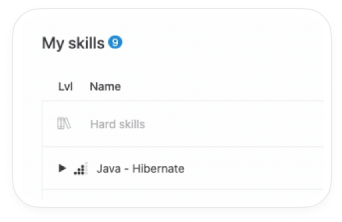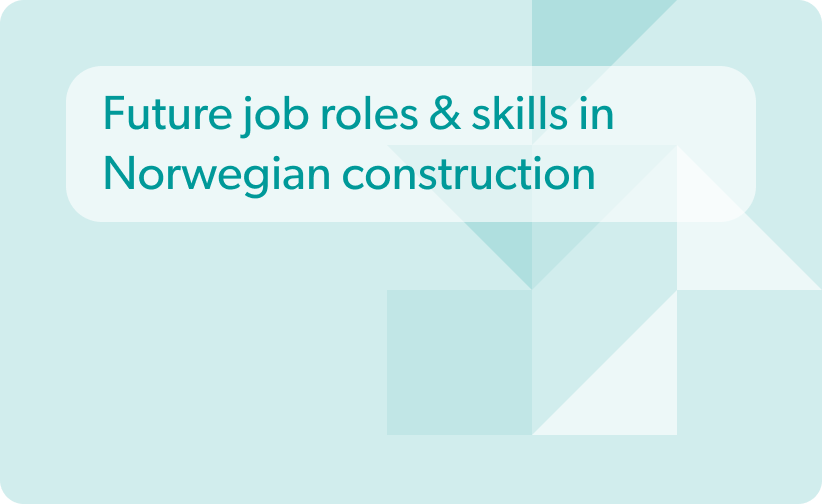There are many opportunities available when looking at the areas of professional development. In a recent job seeker survey, 67% of respondents stated that they are satisfied with their work, though 50% mentioned that they are still open to other job opportunities. Thus, employee development needs aren’t only critical to meeting your company’s skills requirements but are essential for retention and efficiency. For example, 53% of employees believe that employers should be sharing their intentions to meet diverse hiring goals on their social media, blogs, career sites, etc.
Understanding employee development is part of your responsibilities as an organization. As your company’s needs evolve as part of the global digital transformation, every employee who enters your business should have an opportunity for professional growth.
What defines areas of development?
Areas of development are sometimes called competencies or strengths. They include the basic skills and knowledge employees need to perform effectively. To reach their full potential, employees should improve, upskill, and reskill their knowledge and experience.
Areas of professional growth are skills that benefit employees, helping them become more productive and responsive team members. In addition, managers and employers can support developing employees who go beyond academic and technical skills, creating a culture that appreciates self-improvement and personal & professional growth.
Why constantly develop your workforce?
All employees benefit from continuous development, regardless of their specific skill set, specialty, or concentration. Their roles and responsibilities are constantly changing, requiring them to develop and adapt to new challenges.
Soft skills are equally important as hard skills. Organizations benefit in the same way as employees, if not more, from continuous development.
The need to be competitive with such organizations, while improving profitability, motivates companies to invest in their employees, upskilling them. However, due to rapid changes in the world and technology development, the only way to achieve this is to develop employees through constant learning.
While some organizations want people with basic skills, others look for people with extensive experience and knowledge. Both types of employees focus on much broader areas of development for their professional growth.
Imagine a creative and flexible team with an exceptional work ethic, problem-solving skills, amicability, good task prioritization, and adaptability. That would be the ideal team, right?
How do HR leaders know when to reskill, upskill or cross-skill?
Before your reskilling, upskilling, or cross-skilling efforts begin, download this guide to understand the concepts behind these terms so they can fit within your organization’s broader “new skilling” long-term strategy.
Key employee development areas
We all want a workforce made up of confident and empowered people who take the initiative and strive to do the best they can. Therefore, it’s essential to focus on developing the hard and soft skills taught, as well as the software used to enable them.
Soft skills
The digitalization of work has made one thing abundantly clear: soft skills are vital for employees.
According to LinkedIn’s Workplace Learning Report, empowering soft skills affects how employees think and behave. As a result, it should be a number one priority for talent developers, executives, and HR managers. Soft skills prepare employees for virtually any functional need, both now and in the future.
Flexibility
The dynamic of today’s business requires employees to be constantly improving their skillsets and can adapt to ever-changing work situations.
In today’s modern fast-paced business world, areas of professional development help employees stay flexible and relevant. However, a new environment and training for adequate acclimatization require a diverse set of tools.
Here are some key ways to improve professional development areas for employee flexibility:
- Cross-training
- Role, department, and project changing for new responsibilities
- Business trips to other offices, branches, or stores
- Networks support
- Peer learning and knowledge sharing.
Creativity
Creative thinking actually consists of a bundle of skills: problem-solving and communication skills, paired with analytical thinking, to help you develop and share your idea or solution. One of the best ways to expand creative skills is to focus on innovative ways to tackle similar tasks or problems. In addition, doing things differently and moving significantly away from established work style patterns can help you grow in this area.
The field of HR is full of creativity because ready-made solutions don’t always work. Sometimes it takes courage to think differently and stand up to established norms and bureaucracies.
Resolving the challenges involved with human resources requires non-standard thinking to meet the goal of constant innovation:
- Challenge the status quo to question the established, which is the basis of creativity.
- There are no two identical people, situations, problems, or solutions. You, as a manager, should be prepared to experiment.
- Creativity is often an expression of one’s personal beliefs, meaning people should feel free to be themselves when approaching issues.
Communication
Basic communication skills are now a primary focus for most forward-thinking companies, as businesses strive to become more agile in a changing and unpredictable economy. The critical thing is to create an open format, encouraging dialogue in a team.
Here are some communication skills we believe you, as an HR manager, should have:
- Clear writing. Digital communication is the best way for a modern business to interact and avoid miscommunication at all costs.
- Critical listening. Good listening skills help encourage open discussions with both employees and managers and understand the point of view of all parties involved.
- Conflict management. Learn to approach somewhat awkward situations, such as salary negotiations, complaints, and job leavers with sensitivity and poise.
- Prudence and reliability. Build trust and be fair in every aspect of employee interaction, from grassroots to senior management.
- Impeccable ethics. You should keep confidential information confidential, and always remain professional.
Time management
Time management skills are valuable both professionally and personally. The better you manage your time, the more effectively you will meet deadlines, manage your workload, and reduce stress.
One of the best ways to improve your time management skills is to gain a deep understanding of how you spend your time. Start with tracking your days and the time you spend on various tasks. Then, look for tasks you could delegate, analyze when you’re procrastinating, and rely on tools that can help you prioritize your workload.
Here’s a list of tips for effective time management:
- Set goals correctly
- Prioritize wisely
- Take a break between tasks
- Organize your task performance
- Put away insignificant tasks and activities
- Plan.
Conflict resolution & work ethic
Sometimes, doing what is morally right and taking ethical positions in the workplace can cause conflict.
As a manager, the ability to navigate these often-thorny subjects can be invaluable:
- Learn to communicate during stressful situations and master being polite but persistent, which can help you diplomatically resolve these sorts of conflicts.
- A self-assessment of the situation can often lead to tactful decisions to resolve it.
- Punctuality, self-discipline, justice, understanding, tolerance, and empathy are all critical skills that signal both a good work ethic and the ability to manage complicated situations.
By mastering those three points, managers can effectively deal with more complex challenges that require teamwork, social skills, and communication to resolve.
Stress management
Stress management is essential for every company. Creating a less stressful work environment is universally beneficial for both the employer and the employee.
Here are some ways to reduce stress in the workplace:
- Set clearer goals.
- Encourage movement and plan it for the working day.
- Practice stress-relieving exercises at your desk.
- Support staff efforts in dealing with stress by providing access to professional counseling.
- Emphasize and train time management.
- Offer a more flexible work environment.
Leadership
Strong leadership skills are an excellent area of professional development, whether you are a mid-level manager or an experienced C-suite executive. Leadership training helps improve people’s confidence, which can lead to better opportunities and positions – and is undoubtedly beneficial to organizations.
Here are some universal traits you can probably recognize in the successful leaders in your own organization:
- Motivation
- Decision-making
- Team management
- Development of strategies.
Industry knowledge
This area seems obvious, but it can often be overlooked. Industry knowledge is valuable when onboarding new professionals. Companies prefer to hire HR professionals who can onboard new employees rapidly and effectively, increasing their chances of having a happy and successful job in the long run.
Here are some tips to empower your industry knowledge:
- Take online courses that talk about the updates in the industry you work in.
- Subscribe to some online magazines.
- Chat with your colleagues from other departments, learn their needs.
Hard skills
Hard skills often relate to a particular employee’s role. These skills help HR and employers find and hire talented people, manage payroll, and transfer ideas between senior management and lower-level employees.
However, the nature of digital technology inevitably forces you to develop even the most skilled workers in these fields. The best methods are quick, sprint-like seminars and courses. Shorter and sharper bursts are likely to be accepted by staff and remain as relevant as possible.
HR software
Many personnel management programs help improve the organization of HR departments. This type of software helps distribute and categorize personal and professional data for each employee. More and more corporations are turning to technology to better organize their employees’ data.
This skill will allow you to implement HR software in your department:
- Experience in the software will help you gain an edge over your competitors.
- Using special software will allow you to manage documents and communicate with employees more easily.
Onboarding
Onboarding is an essential component for every specialist interested in a long-term relationship with new employees. By developing this skill, you can better help newcomers adapt to a new team.
Since most companies have switched to remote or hybrid work in the last two years, you need to expand your pool of onboarding skills.
Several analytical skills that are essential for managers include:
- Using online tools and software to help explain company policies and culture.
- Creating videos or visual presentations that will include information on job requirements, communication tools, and work productivity tools.
Talent management
As a leader, you don’t simply need to manage – you need to inspire. Good leaders should motivate people to go beyond basic requirements, solve complex problems, and be part of a highly productive work culture. Effective leadership can affect productivity and impact an employee’s motivation, ethics, and relationship with the company.
Here are some suggestions for improving people management:
- Focus on your emotional quotient (EQ)
- Involve everyone in the project
- Focus on communication skills and transparency
- Practice empathy.
Areas of development for remote and hybrid employees
Employees should be able to work independently, and remote work has shown that a highly atomized work environment can be effective. However, the ability to do so is often associated with the areas of employee development such as self-management, maintaining a proactive mindset, and diligence.
Four industry leaders that pay attention to employee development
Many well-known industry leaders are successfully improving soft and hard skills in the workplace, including:
General Electric. GE has developed a curious approach to employee development called the “GE Store,” which involves the exchange of ideas. The company follows the motto that there are no bad ideas, encouraging risk and innovation in all work areas.
Amazon seeks to educate its employees through continuing education using an approach they call the Amazon Technical Academy. Employees can learn skills in high-tech fields and receive Amazon discounts, while receiving paid-for training.
Salesforce managers conduct one-on-one training sessions with teams to help them focus and improve employee development. The company allows employees to receive feedback on how they can develop quickly.
Google is a long-recognized company that values employee development, and Google has been very successful in this area. The “way of Google” is to experiment, fail quickly, and learn from mistakes, having fun along the way.
To sum up
All skills are interconnected. When you develop one, you definitely improve another. Upskilling allows you to become a better specialist, even when focusing on general development.
Whether you are an owner, a manager, a team member, or all three, it’s essential to love what you do. If you don’t, you’ll have trouble inspiring others to improve. As a result, it’s important to discover the joy of learning and upskilling your work.
The positive feedback caused by these emotions will make it easier for you to identify your strengths and weaknesses. By following the advice in this article, you will be able to help yourself, and your employees, learn, grow and improve.
Craving for more HR insights?
Say no more! Every month, we’ll deliver a curated selection of HR tips, best practices, success cases, and more to your inbox.



























 info@hrforecast.de
info@hrforecast.de
 +49 89 215384810
+49 89 215384810






